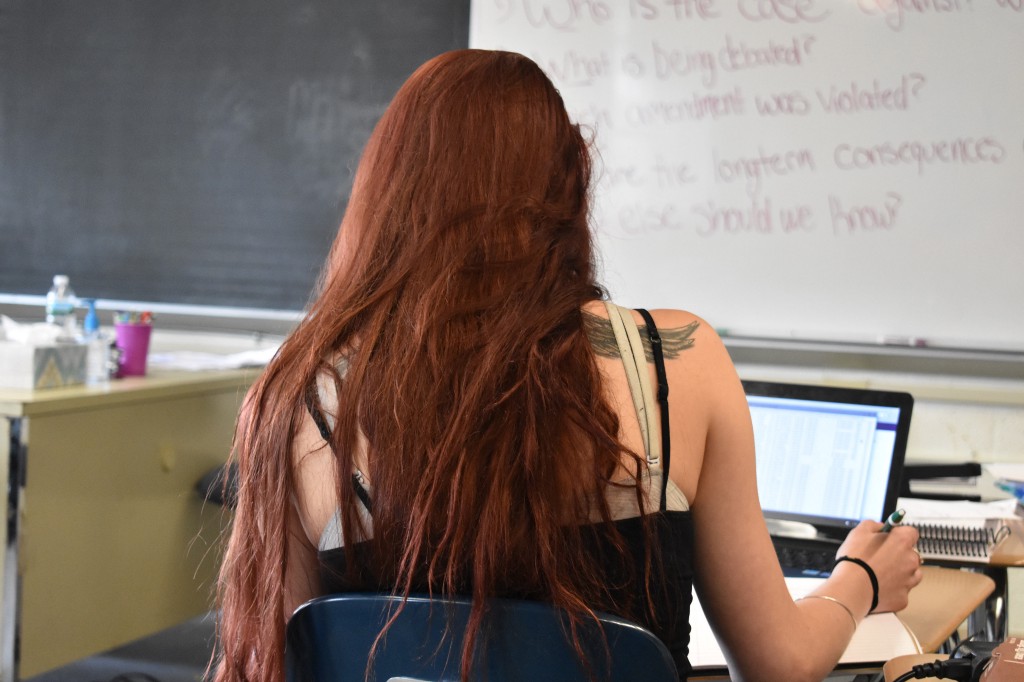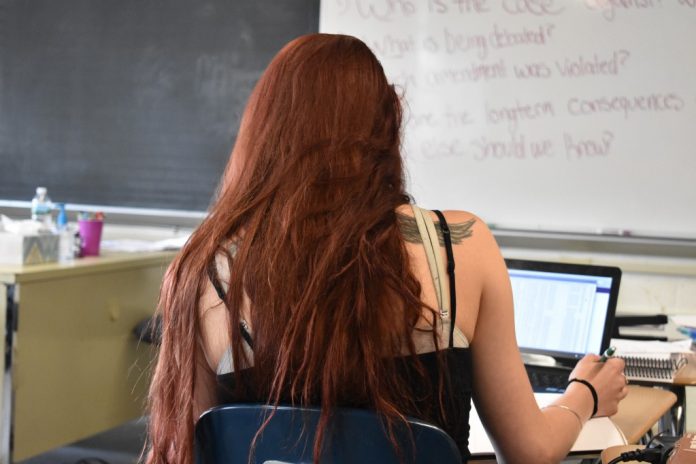The Bridge Way School, the only recovery high school in the state, recently moved to the Northeast.

In just a couple of weeks, Amanda will achieve something she long thought was an impossibility. She’ll graduate high school.
In her current school, she walks through a hallway decorated with artwork of students who no longer use the building to learn. St. Bernard School once occupied the space on Jackson Street, followed by a cyber charter school, both leaving to make room for The Bridge Way School to move in. Amanda is one of five students currently enrolled. On this particular day, just she and two of her classmates are present — each student could have their own classroom if they wanted, but they prefer to study together.
Amanda has a lot to look forward to. She’s thinking about college and has a plan set up. She’ll turn 18 on June 22. By that time, she’ll have graduated high school, and have reached nine months of being clean.
“I’ve really turned my life around,” she said, excitement exuberating from her. “It’s amazing, isn’t it?”
Bridge Way School is the only recovery high school in the state, and moved into its Northeast Philadelphia home the first week of April. The school was established in 2011 by Rebecca Bonner, who serves as Head of School.
With such a tiny student body and a staff of seven, every student receives attention and support.
“This school is my support system,” Amanda said. “I didn’t think I was going to graduate for a while.”
Getting started
When Bonner’s daughter was 14, she started misusing opioids. After several months of treatment, she tried to go back to high school despite warnings to her family not to.
“For many students, their high schools are their pharmacies of choice,” Bonner said.
Bonner had heard of recovery high schools at the time, but the closest one was in Boston, and they weren’t financially prepared to make the move. (Currently, the Association of Recovery Schools lists 40 schools nationwide on its website.) The family wasn’t ready to send their daughter away at her young age.
“She ended up going back to high school, and pretty predictably followed the trend,” Bonner said. Eight out of 10 kids returning to high school relapse within the first six months. If there is any type of co-occurring issue, such as depression, anxiety or bipolar disorder, the median time to relapse is 19 days. Bonner’s daughter relapsed twice, but had support of two teachers who were also recovering.
Her family’s experience motivated Bonner to start the recovery school. She left her job at the end of the year in 2009, and got it started in 2011.
Bridge Way first opened at a location in Roxborough and remained there for six years, until Bonner said they outgrew the space.
Initially, the school was going to move to St. Dominic’s School at 8510 Frankford Ave., but community members voiced opposition. She said it was a stark difference from when they set up in Roxborough, which welcomed the idea after speaking with her.
“People came out of the woodwork and said they did not want a recovery school in their neighborhood,” Bonner said. “The priest tried to open the meeting with a prayer — he got shouted down.”
St. Bernard reached out shortly after the meeting to offer them their space as they relocated.
“They understood what we were doing,” she said. “They understood our kids are good kids.”
Meet the class
When she was in elementary school, Amanda was a great student. When she was in middle school, she was decent, but her grades started dropping. By the time she trawled into high school, she would show up “just to get the day in.”
“I would sit in my class and not do anything,” she said of her former public school. “My teachers got used to me not doing anything, so they didn’t try to motivate me to do anything.”
Amanda was 11 years old when she first experimented with opioids. She said it didn’t progress into a full-blown addiction due to lack of availability for a couple of years, but by the time she was 14, she was addicted to methadone, among a variety of narcotics. She also started heroin.
“Heroin should not be thought of as recreational at all, but that’s kind of what I thought of it,” she said. “It progressed into every single day I was using. I would be sick if I didn’t.”
She actually didn’t know it was heroin until it was too late. The people she talked to referred to it as “dope” — “I didn’t know what that was,” she said.
She tried to get herself clean multiple times, but couldn’t last more than three days by herself. On her last attempt, she made it a week and a half.
Then she got arrested in front of her classmates.
“I had empty bags on me, which I didn’t know I had on me,” she said. Officers came into the school and emptied all of her bags, straws and paraphernalia onto the ground in front of everyone.
She was expelled.
“I expected the people at [the school] to be mad and look at me with disgust, but they really didn’t,” she said. “They looked at me and felt sorry for me, and I didn’t want them to be sorry, but they looked at me like I was completely broken.”
Amanda is in a much better place now, using support from Bridge Way to get her life back together.
One of her classmates is Reno, 16. He ended up at Bridge Way after being expelled from three Philadelphia schools, and ultimately banned from the district.
He used to get into fights. He’s not sure why, but he would get angry ever since he was a kid.
“I just don’t like talking to people,” he said. “I push people away when they get close to me. There were just too many people in public school.”
His probation officer found Bridge Way because Reno was smoking and abusing Xanax. He wasn’t supposed to graduate until 2020, but was able to move the date up a year with renewed focus on his studies. Bridge Way is a much better fit for Reno — “There’s a lot less people,” he said.
Another classmate is Courtney, 17. Courtney has benefitted from smaller class sizes at Bridge Way compared to public high school.
“I wasn’t really showing up, and even if I wanted to do the work I just wasn’t able to because I was in classes of 30 people and there just wasn’t enough help,” she said.
Courtney has attended the school since March 2017, and is using it to bring her closer to her dream of becoming a trauma therapist.
“I just feel like a lot of people have trauma that they don’t address,” she said.
Class in session
Chairs are arranged in a circle in one of the school’s oversized classrooms. Curtains hang in front of the walls as light shines in from the windows. It’s a huge space for just five students, but Bonner has plans to quickly expand in the near future.
Each day begins with counselor Nancy Barton leading a group discussion session where students have the opportunity to reflect on their feelings, positive or negative. Barton also works with each student on an individualized recovery plan that is figured out during the admission process. To be accepted, students have to have at least 30 days of sobriety. Drug tests are given at random.
The day is divided into 12 periods, where the students participate in typical high school subjects like math, science, English and physical education. Amanda, for example, is currently completing a second semester of algebra, geometry and chemistry among her other classes so that she can graduate on time.
Much of the coursework is performed online at an individual level due to different ages of students. The school also teaches executive functioning skills split into two periods, life skills and study skills.
“We’ve found in our last seven years it doesn’t matter where a kid comes from, nobody is being taught executive functioning skills,” Bonner said. This includes managing day-to-day and long-term planning, from completing assignments on time to preparing for college.
Bonner said over 90 percent of the students who have gone through the school have gone on to college. Since the school opened, it has served approximately 125 students. Bonner said most go on to graduate from other high schools after they leave Bridge Way, and 17 have graduated directly from Bridge Way.
The school is private and receives funding through Pennsylvania’s four-year recovery high school pilot program. Next school year, the first 20 students to register will have their tuition paid through the program. It is 60 percent state funded, and 40 percent funded by the School District of Philadelphia.
Community connection
CORA Services is announcing its official partnership with Bridge Way due to their aligned missions of adolescents and families receiving the help they need in their own community.
“In light of all the attention the city has had around the opioid epidemic, one of the points commonly brought up is adolescence and prevention in schools,” said Anne Marie Schultz, CEO of CORA. “We’re trying to support adolescents on the edge of trying.”
Schultz called the school the “missing piece from their tool kit” in reaching kids at schools. CORA will be helping with the admissions process to make sure students are ready to enter the school, and connecting them with resources in case they are not.
“We hosted listening sessions and came up with Know Drugs in the Northeast to help,” said Mary Doherty of CORA. “That was the beginning. Now we’re targeting where the kids are.” ••
Logan Krum can be reached at [email protected]





